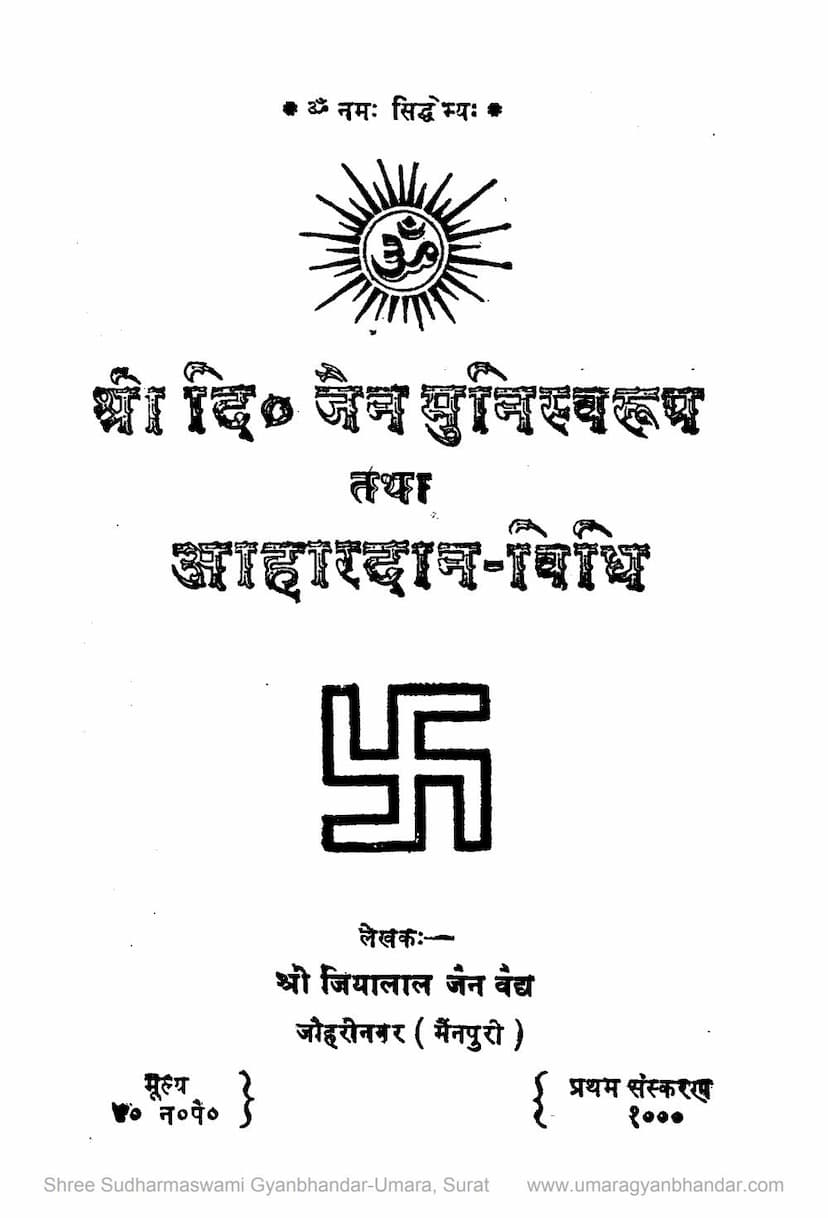Digambar Jain Muni Swarup Tatha Aahardan Vidhi
Added to library: September 1, 2025

Summary
This document, "Shree Digambar Jain Muni Swarup Tatha Aahardan Vidhi" (The Form of Digambar Jain Monks and the Method of Offering Food) by Jiyalal Jain, is a guide for lay Jains (Shravaks) on understanding the ascetic life and the proper way to offer food to Jain monks.
Core Purpose:
The book aims to educate and guide Shravaks on their religious duties, specifically focusing on the respect and proper methods for serving Jain monks (Munis) and other ascetics like Aryikas, Aikaks, and Kshullaks. It emphasizes the spiritual significance of such acts within Jainism.
Key Themes and Content:
-
The Ideal Jain Monk (Muni Swarup):
- The text defines what constitutes a true Jain Muni, highlighting their detachment from worldly possessions, senses, and even their own bodies.
- They are described as those who have conquered their passions (Kashayas), are liberated from worldly desires, and are devoted to knowledge, meditation, and austerities.
- The 28 fundamental virtues (Mool Gunas) of a Muni are listed, encompassing the five great vows (Mahavratas), five careful activities (Samitis), control of senses, and other ascetic practices like hair-plucking and nudity.
- The text mentions the 22 types of hardships (Parishahas) that monks overcome and the different categories of monks (Acharya, Upadhyaya, Sadhu).
- It explains the qualifications and roles of Acharyas (spiritual leaders) and Upadhyayas (teachers of scriptures).
-
The Importance of Alms-giving (Aahardan):
- The book asserts that alms-giving is a vital part of a Shravak's six daily duties (Shatkarmas).
- It differentiates between four types of charity: Abhayadaan (fearlessness), Jnaanadaan (knowledge), Aushadhidaan (medicine), and Aaharaan (food).
- The paramount importance of giving food to the deserving (Satpatra), especially monks, is stressed, citing the example of King Shreyans offering food to Lord Rishabhdev.
- It highlights that such acts lead to immense spiritual merit, purification of the soul, reduction of passions, and ultimately, spiritual liberation (Moksha).
-
The Methodology of Offering Food (Aahardan Vidhi):
- The book provides detailed instructions on how to prepare and offer food to monks, emphasizing purity and adherence to Jain principles.
- Purity (Shuddhi): This is a central theme. It covers:
- Purity of the Kitchen (Chowka): Instructions on maintaining a clean and pure kitchen, including rules about water, fire, utensils, and avoiding contamination. The concept of four types of purity (Dravya, Kshetra, Kaal, Bhaav – substance, place, time, and intention) is explained.
- Purity of Ingredients: Rules regarding water (Prashuk jal), grains, spices, and dairy products, including their permissible times (Maryada) after preparation.
- Purity of Utensils: Guidance on the suitability and purification of various types of utensils (metal, earthen, glass).
- Purity of the Donor (Daata): The seven virtues of a donor are listed: Shraddha (faith), Bhakti (devotion), Santosha (contentment), Vigyan (knowledge of methods), Kshama (forgiveness), Satva (truthfulness), and Nirlobhita (non-greed).
- The Nine-fold Devotion (Navadha Bhakti): A detailed explanation of the nine acts of reverence and service before and during the meal offering: receiving the Muni, offering a high seat, washing feet, worshipping, bowing, purity of mind, purity of speech, purity of body, and purity of food.
- Serving Procedure: Step-by-step instructions on inviting the monk, offering water, presenting the food item by item, and understanding their signals.
- Distinguishing Types of Ascetics: Guidance on offering food to different categories like Munis, Aryikas, Aikaks, and Kshullaks, noting differences in their eating practices (sitting vs. standing, using hands as bowls vs. utensils).
- What to Avoid: Rules about who to accept alms from and who to refuse, and the five transgressions (Atichars) of the vow of hospitality (Atithi Samvibhag).
-
The Role of the Shravak:
- The book reinforces that serving Gurus and practicing charity are essential duties of a householder.
- It encourages Shravaks to cultivate the virtues of a giver and to perform these duties with sincerity and devotion.
Overall Message:
"Shree Digambar Jain Muni Swarup Tatha Aahardan Vidhi" is a practical and devotional guide that seeks to preserve and disseminate the traditional Jain practices related to the respect and sustenance of ascetic monks. It emphasizes the profound spiritual benefits for lay followers who diligently adhere to these principles, highlighting that such acts are crucial for their own spiritual progress and ultimate liberation. The book is written with the intention of providing clear, concise information for the benefit of the Jain community.